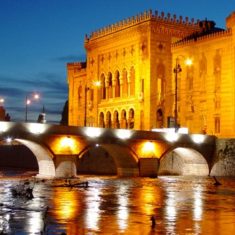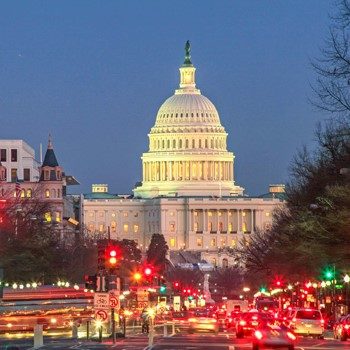|
|

Sarajevo Symposium finishes last week
|
|

DC Symposium heads into last week
|

Stabilization Symposium videos now online
|
|
|
|
|
|
|
This week in:
IPSI | Africa | Americas | East Asia | Europe & Central Asia | Middle East | South Asia
|
|
|
|
|
|
This week in Sub-Saharan Africa
|
|
|
|
|
|
KENYA: Thousands of homes destroyed to make way for road
On Monday, Kenyan officials demolished the homes of 30,000 people in Nairobi’s largest slum, Kibera, to clear the path for a USD 20 million road project. Construction of the major road is part of a “government plan to ease traffic congestion” in Kenya’s capital city, home to over three million people. Authorities gave the residents of Kibera a two-week notice to vacate their homes, but thousands remain displaced due to the forced evacuations. Comment: Kibera residents attempted to combat the road’s construction in court last year, but failed when the judge ruled that the road was in the public’s best interest. Amnesty International condemned the evictions, accusing Kenyan authorities of breaching an arrangement to resettle the residents before demolishing their homes. (Daily Nation, BBC, Reuters)
|
|
|
|
|
|
NIGERIA: 15 senators resign as tensions mount in ruling coalition
On Tuesday, 15 senators quit President Muhammadu Buhari’s All People’s Congress (APC), citing mounting internal rifts within the ruling party. Upon abandoning APC, the officials who resigned joined the opposition People’s Democratic Party. Senate President Bukola Saraki, APC’s third in command, stated that the chances of him also leaving the party are “very, very high.” Comment: The widespread defections significantly hurt Buhari’s prospects of re-election in the impending February 2019 elections. The continued splintering of the ruling coalition also hinders the president’s capacity to enact his legislative agenda over the remainder of his current term. (Vanguard, Premium Times, Reuters)
|
|
|
|
|
|
ZIMBABWE: Accusations of voter manipulation mount ahead of nationwide poll
On Tuesday, the UN human rights office reported increased incidents of voter intimidation ahead of the historic July 30 vote; the first since Robert Mugabe’s ouster last November. According to reports, government forces are coercing citizens into attending campaign rallies, particularly in rural areas. Current President Emmerson Mnangagwa, a former Mugabe associate, has long vowed that there will be a free and fair election, which he anticipates will help lift international sanctions on Zimbabwe. Comment: While there are numerous candidates vying for the presidency in next week’s election, the vote effectively narrows down to Mnangagwa and opposition challenger Nelson Chamisa, leader of the Movement for Democratic Change. Chamisa recently stated that despite serious concerns over voter and media manipulation, his party will not boycott the elections. (Daily News, Reuters, News24, AP)
Researched/Written by Matan Ayash
|
|
|
|
|
|
This week in the Americas & Caribbean
|
|
|
|
|
BRAZIL: Far-right politician joins presidential race
On Sunday, far-right congressman and former army captain Jair Bolsonaro addressed a rally in Rio de Janeiro, announcing his candidacy for Brazil’s presidential elections in October. The rally encompassed about 3,000 supporters and an impersonator of Donald Trump. Bolsonaro said he would be represented by the Social Liberal Party (PSL). Comment: In the past, Bolsonaro has praised Brazil’s military dictatorship and vowed to loosen gun controls. He is currently being investigated for alleged racist remarks about Afro-Brazilians. (BBC, The Telegraph, Foreign Affairs)
Researched/Written by Kritika Kapoor
|
|
|
|
|
|
COLOMBIA: Former FARC rebels join new Congress
On Friday, 10 former members of the Revolutionary Armed Forces of Colombia (FARC) took their seats in Congress at its opening in the capital city of Bogota. Colombia’s former president Juan Manuel Santos addressed Congress and expressed satisfaction at seeing the former rebels respecting the constitution. According to the 2016 peace agreement between FARC and the government, the newly established FARC political party receives 5 seats each in the two chambers of Congress. Comment: The right-wing president-elect Ivan Duque and his party are opposed to amnesty for FARC for their war crimes and seek to prevent their political participation. (Reuters, Al Jazeera, BBC)
Researched/Written by Kritika Kapoor
|
|
|
|
|
|
NICARAGUA: At least four killed in clashes in capital, president denies responsibility
At least four people, including a baby, have been killed in the capital city of Managua since Saturday, after pro-government security forces opened fire on protesters. On Monday, President Daniel Ortega denied that he controls paramilitary groups blamed for those killings and hundreds of others since anti-government protests began in April, saying that they are controlled by his political opponents and foreign enemies. One of the victims, a Brazilian student, was shot and killed Monday night by armed pro-government forces, prompting Brazil to recall its ambassador to Nicaragua and condemn the violence against the protesters. Comment: The protests began in April as demonstrations against social security cuts – they have since developed into calls for President Ortega’s resignation after pro-government military and civilian forces began attacking protesters. (Today Nicaragua, BBC, AP, NY Times)
Researched/Written by Abby Fram
|
|
|
|
|
|
This week in East Asia & Pacific
|
|
|
|
|
CAMBODIA: Armed show of power ahead of general election
 |
|
On Wednesday, Cambodia’s armed forces displayed anti-riot gear and assault rifles at a sports stadium in the capital ahead of Sunday’s general election, in a suspected show of power on behalf of Prime Minister Hun Sen and the ruling Cambodian People’s Party. The police presence was meant to discourage citizens from protesting the election; the interior minister stated that anyone affiliated with the protests would be fined USD 5,000. Prime Minister Sen has ruled for more than thirty years and is expected to win again, as the main opposition party, the Cambodian National Rescue Party (CNRP), was dissolved last year as part of a government crackdown on suspected dissenters. Comment: On Monday, UN Special Rapporteur on human rights in Cambodia Rhona Smith criticized the Cambodian government, expressing concern over suspected voter intimidation. The Cambodian foreign minister rejected Smith’s claims, saying that the international community is downplaying how the CNRP’s former leader used populism to foster anti-Chinese sentiment and spark a military rebellion against the Cambodian government. (Al Jazeera, Channel News Asia, Reuters, VOA Khmer)
|
|
|
|
|
|
CHINA: Investigation into company producing faulty vaccines
 |
|
On Sunday, Chinese authorities ordered Changchun Changsheng Life Sciences Limited (CCLSL) to stop all production in order to launch an investigation into allegations that the company was producing substandard vaccines for patients as young as three months old. Vice Premier Li Keqiang vowed to crack down on “criminal acts that endanger the safety of people’s lives.” Chinese citizens expressed concern over possible exposure to faulty vaccines for illnesses such as Hepatitis A and meningococcal meningitis. Comment: According to the 2017 annual report by the country’s National Institutes for Food and Drug Control, China has imported between two to two and a half percent of vaccines per year since 2015; CCLSL is the second largest vaccine producer in the country. The nation has experienced vaccine scandals in the past, including a series of lawsuits from 2006 to 2009 when children became permanently disabled after receiving faulty meningococcal vaccines. (BBC, Fierce Pharma, Human Rights Watch, South China Morning Post, Xinhua Net)
|
|
|
|
|
|
LAOS: Thousands homeless and missing as dam collapse floods villages
On Tuesday, Vientiane Times reported that more than 6,600 Laotians are homeless and hundreds more are missing in the southern Attapeu province after a hydroelectric dam collapsed, sending flash floods throughout six villages. Officials are working to evacuate those in affected areas, which according to social media posts, were flooded to such a extent that people were forced to sit on rooftops to avoid the waters. U.S.-based environmental group International Rivers wrote in an email to Reuters that Laos is experiencing increasingly extreme weather which exposes the dams’ weak points. Comment: Thirty percent of Laos’ exports alone are in hydroelectric power, which the national government hopes will propel the country’s status from one of the poorest nations in Asia to the “battery of Asia.” Environmental groups have expressed concerns over how these dams will affect the Mekong River’s flora and fauna that nearby communities rely on. (BBC, The Nation, Reuters, Vientiane Times)
Researched/Written by Nida Kuruvilla
|
|
|
|
|
|
This week in Europe & Central Asia
|
|
|
|
|
GREECE: Wildfires devastate Attica region, government says arson possible
Wildfires in the Greek region of Attica have killed up to 85 people as of Thursday, and officials say the death toll is expected to rise as search parties comb through burned wreckage. The fires, which began Monday in the cities of Kineta and Rafina, quickly spread to the towns of Neos Voutzas and Mati, powered by gale-force winds of up to 80 mph. Officials have raised concerns about the many simultaneous fire fronts, saying they may be the result of arson – Citizen Protection Minister Nikos Toskas said “These fires are not that innocent.” Comment: The Greek government has requested drones from the U.S. to observe any suspicious activity. Arsonists may have started the fires in order to loot abandoned homes. Hospitals treated 187 people after the fire, with 10 listed as being in serious condition. (Greek Reporter, AP, NY Times, BBC)
|
|
|
|
|
|
POLAND: Parliament approves bill to fast track changes in Supreme Court
After nine hours of debate and bitter protests by opposition parties, Poland’s upper parliament approved an amendment late Wednesday night that allows the ruling party to name the next chief of the Supreme Court. The amendment has been widely criticized by the EU and human rights organizations as an infringement on judicial independence, but the ruling Law and Justice (PiS) party says that the changes are part of a necessary overhaul to the courts. During the debate, activists and opposition politicians demonstrated outside the Senate building and all over Poland, chanting “We will defend democracy” and “Free courts.” Comment: PiS says that the overhaul is needed to make the courts more efficient and to remove communist-era judges and their influence. The new appointments made so far are comprised largely of party backers. (Radio Poland, Reuters, AP, BBC)
|
|
|
|
|
|
REGIONAL: EU leaders reach agreement with US to lower trade barriers
The EU and the United States pulled back from the brink of a trade war Wednesday, as President Donald Trump and European leaders agreed to open talks to lower tariffs and other trade barriers. In a joint statement, Trump and European Commission President Jean-Claude Juncker said the talks would seek to resolve U.S. tariffs on European steel and aluminum, and that the two regions would hold off on any further tariffs for the time being. Juncker called the agreement a “major concession” on Trump’s part, and that he expected the president to follow through on it. Comment: The agreement between the two leaders defused a trade battle that began with President Trump’s tariffs on steel and aluminum in March; the president also threatened to put tariffs on European automobiles. Juncker said after the meeting that as long as the two sides were negotiating on trade, they would hold off on any further tariffs, including potential U.S. tariffs on cars and auto parts. (BBC, NY Times, Reuters, AP)
Researched/Written by Abby Fram
|
|
|
|
|
|
This week in the Middle East & North Africa
|
|
|
|
|
REGIONAL: Israeli Defense Forces shoot down Syrian fighter jet
 |
|
On Tuesday, Israel shot down a Syrian warplane that allegedly crossed into the occupied Golan Heights, part of Israeli airspace. Syrian state media responded by denying Israel’s claim and framing the incident as an attack on Syria’s sovereignty. The incident is the latest development in recent weeks of aggression over the Golan region, which both nations see as an area of strategic interest. Israeli Prime Minister Benjamin Netanyahu stated that the fighter jet’s presence was a “gross violation” of the 1974 UN armistice that demilitarized most of the Golan Heights. Comment: On the same day, UN envoy for the Middle East Nickolay Mladenov warned of “a disturbing trajectory of increasingly frequent and dangerous confrontations” between Israel and Syria. Israeli officials are concerned that if Syrian President Bashar al-Assad does not share Israel’s stance against Iran, the opportunity appears for Iranian or Hezbollah forces to operate in the region. (Haaretz, Syrian Arab News Agency, Reuters, Washington Post)
Researched/Written by Nida Kuruvilla
|
|
|
|
|
|
SYRIA: Series of attacks kill at least 200 in southern Syria
On Wednesday, the self-proclaimed Islamic State carried out a series of coordinated attacks in the southern province of Sweida, resulting in the deaths of over 200 people. One suicide bomber detonated his explosives in the middle of a busy market in the city of Sweida, while other Islamist militants simultaneously carried out attacks on three villages to the northeast of the city. Comment: The province of Sweida remained relatively unscathed throughout the deadly seven-year conflict. Following recent offensives, government forces control the majority of the region, with the exception of select extremist and rebel enclaves. (Al Jazeera, Reuters, AP)
Researched/Written by Mayan Atash
|
|
|
|
|
|
TUNISIA: Prime minister refuses to step down amid enduring crises
On Tuesday, Prime Minister Youssef Chahed rejected mounting calls for his resignation amid political and economic crises, stating that a “change of government would put the economy at risk and shake the confidence of international lenders.” Earlier this month, President Beji Caid Essebsi urged the prime minister to step down if the country’s ongoing crises failed to improve. Chahed continues to insist that the economy will show positive signs by the end of the year. Comment: High rates of inflation and unemployment have plagued Tunisia since the overthrow of Zine al-Abidine Ben Ali in 2011. Economic turmoil coupled with a consistent extremist presence in the country has discouraged global investors, such as the International Monetary Fund, who have financially supported the north African nation throughout the economic slump. (The New Arab, Reuters, Asharq Al-Awsat, News24)
Researched/Written by Matan Ayash
|
|
|
|
|
|
AFGHANISTAN: Suicide bomber attacks airport as Vice President Dostum returns
On Monday, a suicide bomber attacked the Kabul Airport, killing 14 people and injuring 50 others. Vice President Abdul Rashid Dostum, who was returning from a year-long exile in Turkey, left the airport minutes before the blast. A local affiliate of the self-proclaimed Islamic State claimed responsibility for the attack. Comment: Instability and attacks by the Islamic State are on the rise in the run up to the October elections. Dostum, a former Uzbek warlord and Afghanistan’s vice president since 2014, is facing allegations of torture and sexual abuse of a political rival. (Reuters, CBS, BBC)
|
|
|
|
|
INDIA: Vigilantes lynch Muslim cow-trader; police admit delayed action
On Saturday, a group of five-to-seven men surrounded a Muslim man and beat him to death for allegedly transporting two cows from the state of Rajasthan to Haryana. According to hospital records, it took the policemen three hours to take the injured man to a nearby hospital where he was declared dead. On Tuesday, a top police official admitted the police’s “error of judgment” in taking the cows to a shelter first – the state suspended one police officer and arrested three of the attackers. Comment: Hindus consider cows sacred and killing them is illegal in several states; so-called “cow-vigilantism” is meant to protect the animals from slaughter. On Tuesday, in parliament, the home minister promised a new law to deal with the growing number of religiously-motivated vigilante lynchings in India. (BBC, Reuters, The Guardian)
|
|
|
|
|
|
PAKISTAN: Suicide bomber attacks polling station on election day
On Wednesday, a suicide bomber rammed a motorcycle into a crowd of people waiting to cast their votes outside a polling station in Quetta, Balochistan. The ensuing explosion killed at least 31 people and wounded 35 others. Local officials blame the self-proclaimed Islamic State; sources say that the group claimed responsibility within hours. Comment: On Wednesday, Pakistanis voted for their national and provincial assemblies, in a rare democratic transition of power. The Human Rights Commission of Pakistan stated that there have been “blatant” attempts to manipulate the polls through fraud and violence. Last week, the second deadliest attack in Pakistan’s history killed at least 149 people, including a Baloch candidate, in Balochistan province. (BBC, Huffington Post, CNN)
Researched/Written by Kritika Kapoor
|
|
|
|
|